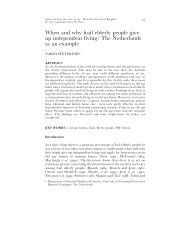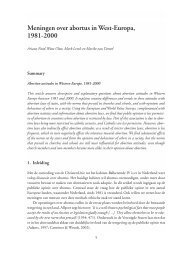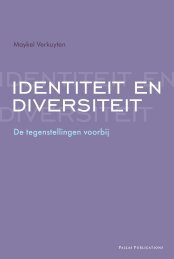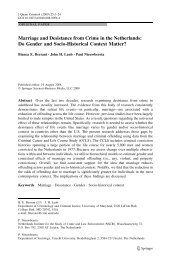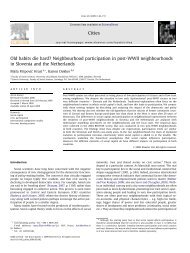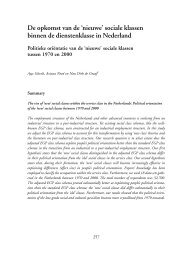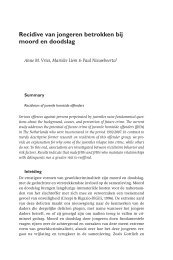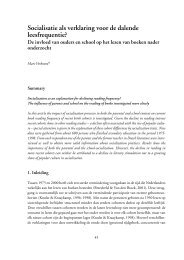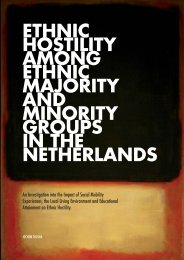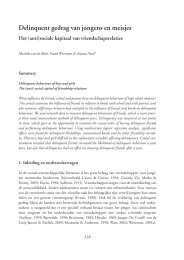Association of criminal convictions between family members: Effects ...
Association of criminal convictions between family members: Effects ...
Association of criminal convictions between family members: Effects ...
Create successful ePaper yourself
Turn your PDF publications into a flip-book with our unique Google optimized e-Paper software.
Criminal <strong>convictions</strong> <strong>between</strong> <strong>family</strong> <strong>members</strong>95Pittsburgh Youth Study (PYS) also revealed a great deal <strong>of</strong> crime-clustering withinfamilies (Farrington et al., 2001). These results indicated that the siblings in 12%<strong>of</strong> families were responsible for 59% <strong>of</strong> all <strong>of</strong> the delinquent acts committed bythe sample. Other research demonstrates that <strong>criminal</strong> <strong>convictions</strong> <strong>of</strong> siblings arehighly correlated (Haynie and McHugh, 2003; Rowe and Gulley, 1992). In short,having a <strong>family</strong> member with a <strong>criminal</strong> history – parents and siblings alike – substantiallyincreases the likelihood <strong>of</strong> a person committing delinquent acts. In thepresent paper, we focus on parental and sibling <strong>convictions</strong> as explanations <strong>of</strong>variations in individual <strong>criminal</strong> behaviour. This will give us more insight intohow the <strong>criminal</strong> behaviour <strong>of</strong> one nuclear <strong>family</strong> member is related to the<strong>criminal</strong> behaviour <strong>of</strong> other <strong>members</strong>. It will also allow us to study the intergenerationaltransmission <strong>of</strong> <strong>criminal</strong> behaviour.The paucity <strong>of</strong> research inquiry into the influence <strong>of</strong> families on <strong>criminal</strong>ityhas numerous causes. 1 The most prominent cause is that the data requirementsto investigate the relationship are daunting. First, we require a longitudinal studyproviding information on the development <strong>of</strong> <strong>criminal</strong> behaviour <strong>of</strong> parents aswell as their children. Second, a prospective study design is needed, as such adesign does not select upon the dependent variable (in this case, <strong>criminal</strong> behaviour<strong>of</strong> the children). Convicted as well as non-convicted parents should beincluded in the design. Third, a very long period <strong>of</strong> observation is required inorder to analyse both generations until adulthood (a time span <strong>of</strong> at least 50years). Fourth, we need data on the <strong>convictions</strong> <strong>of</strong> all the siblings within a <strong>family</strong>.The present study is advantageous because we were able to meet all theserequirements.Influence <strong>of</strong> siblingsIn past decades there have been many studies <strong>of</strong> the influence <strong>of</strong> the <strong>criminal</strong>behaviour <strong>of</strong> brothers and sisters on individual <strong>criminal</strong> behaviour. Most <strong>of</strong> thesestudies rely on self-reported data and relatively minor <strong>of</strong>fences (e.g. shopliftingand drug abuse). Many <strong>of</strong> these studies also analysed the <strong>criminal</strong> behaviour <strong>of</strong>siblings and friends simultaneously (Haynie and McHugh, 2003; Slomkowskiet al., 2001). The existing research shows that the <strong>criminal</strong> behaviour <strong>of</strong> siblingsis strongly correlated (Fagan and Najman, 2003; Haynie and McHugh, 2003;Rowe and Gulley, 1992). Correlations are usually stronger among same-sex siblings(0.45 to 0.50) than among opposite-sex ones (0.27) (Rowe and Farrington,1997).1 Farrington et al. (1996) acknowledge that the training <strong>of</strong> American criminologists could be onesuch cause. Given its close historical ties to the discipline <strong>of</strong> sociology, American criminology,for many years, largely ignored research on the genetic origins <strong>of</strong> human behaviour. A similarreluctance to perform research into biosocial causes <strong>of</strong> <strong>criminal</strong> behaviour may be seen amongDutch criminologists (Blokland et al., 2005).Copyright © 2009 John Wiley & Sons, Ltd 19: 94–108 (2009)DOI: 10.1002/cbm



